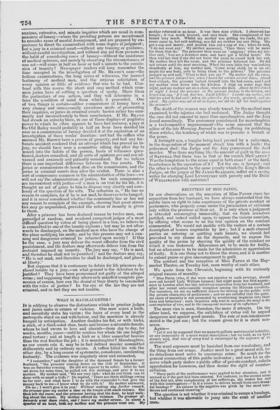WHAT IS MANSLAUGHTER?
IT is edifying to observe the distinctions which in practice judges and juries make in crimes of violence. One man seizes a knife, and mercifully stabs his victim ; the hairs of every head in the metropolis stand on end with horror, and the murderer is already hanged by anticipation. Another doubles his fist, or with kicks, a stick, or a thick-soled shoe, beats and bruises a miserable female, whom he had sworn to love and cherish—from day to day, for weeks, months, years—until he renders her whole life one length- ened torture ; and at length a kick or a blow somewhat heavier than the rest finishes the job ; it is manslaughter! Manslaughter, as our courts rule it, may be in fact defined murder committed deliberately and by ordinary means. A ruffian killed his wife the other day, by a long course of systematic, considerate, unrelenting barbarity. The evidence was singularly clear and connected; "I remember," said the daughter of the deceased female by a former husband, "the prisoner coming home on the 11th of September. It was on Saturday evening. He did not appear to be sober. After he had sat down for some time, he pulled out five shillings, and gave it to my mother. My mother said, 'We are very rich : what do you think can be done with so small a trifle ?.- He replied, 'There are three shillings owing us for rent; and what have I to do with the remainder ?—but give the money back to me—I know what to do with it.' My mother answered, Oh no ; I won't give it to you.' Without making any further remark, the prisoner gave my mother a blow on the temple with much violence. She then left the room, and the prisoner having shut the door, he kept walk. lag about the room. My mother offered no violence. The prisoner af- terwards went down stairs, and I heard my mother scream. In about a quarter of an bout, both my mother and the prisoner went out. My mother returned in an hour. It was then nine o'clock. I observed her temple ; it was much bruised, and very black. She complained of her breast very much. Whilst my mother was getting tea ready, the pri- soner came in, but said nothing, nor did my mother say any thing. She got a cup and saucer, and poured him out a cup of tea ; when he said, do not want any.' My mother answered, 'Then there will be more for them that do.' The prisoner then went on 'nagging;' when my mo- ther said, You are a drunken man, and have got a brutal heart.' He then told her that if she did not leave the room he would kick her out. My mother then left the room, and the prisoner followed her. He did not return until the next morning. When his own little boy was looking steadfastly at him, my mother said, 'Come away child, he is no ex- ample for any body, only to bring them to the gallows.' The prisoner jumped up and said, What is that you say ?' Illy mother left the room, and the prisoner followed her, when I heard her scream several times. About four o'clock, the prisoner locked himself into the bed-room, and I and my mother went down into the kitchen. I slept on some Jags that night, and my mother sat on a chair, where she died. About twelve o'clock at night I heard the prisoner in the passage leading to the kitchen, and heard him say, If I can find her, I will kilt her.' I awoke my mother, and told her what he had sail; when she uttered a few words, groaned, and ex- pired. My mother was not at all in liquor, nor did she lift her hand against the prisoner."
The death of the woman was clearly traced, by the medical men examined, to the injuries she had sustained. The Judge thought the case did not amount to more than manslaughter, and the Jury found accordingly. The customary punishment for manslaughter is a twelvemonth's imprisonment—the same amount that the editor of the late Morning Journal is now suffering for publishing three articles, the tendency of which was to provoke a breach of the peace.
A fortnight ago, a burglar being hard pressed by a policeman, in the desperation of the moment struck him with a knife : the policeman died: the Judge and the Jury pronounced the deed murder. Was there anything like the amount of guilt in the case of SAPWELL that there was in that of the wretch MoCAargy ?
Was the temptation to the clime equal in both cases? or the hard- heartedness in the execution of it? Yet the one is hanged ; and the other is subjected to the same penalty which the King's Bench Judges, on the prayer of Sir JAMES SCARLETT, inflict on a raving writer for charging Lord LYNDHURST with poverty and the Duke of WELLINGTON with ambition !


























 Previous page
Previous page